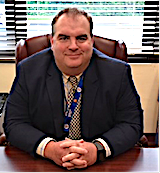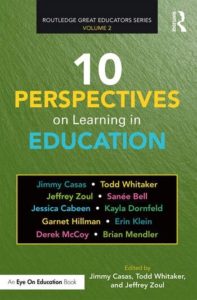Ed Leaders Share Ideas for Going Forward
10 Perspectives on Learning in Education
Edited by Jimmy Casas, Todd Whitaker and Jeffrey Zoul
(Routledge/Eye On Education, 2020 – Learn more)
Reviewed by Brian Taylor

An unfortunate byproduct of this doubt is that the core mission of educators has been lost over the last two years. Survival, both personal and professional, has been top of mind.
It’s now time to reclaim our why. Why do you do what you do every day for students? 10 Perspectives on Learning in Education is the book that may help you accomplish that mission.
The voices of education thought leaders

There are discussions on learning how to lead, learning as leaders, becoming more emotionally intelligent, supporting standards based learning, taking a design-thinking approach, and making learning about connections, to name a few.
Insights I gleaned from these essays
Todd Whitaker, “Learning to Lead” – Whitaker is one of the most prolific and effective writers among educational leaders today. His writing is down to earth, understandable, and insightful in how to be a better teacher and leader. This essay provides awareness into how to start your leadership journey. “Having the strength to do what is right while you are in the minority is leadership” (p.7).
Jeffrey Zoul, “Schools that Unlearn” – Zoul discusses what needs to be done for continuous school improvement. In many cases doing new things is not enough; we need to stop doing things that are ingrained in school cultures but are no longer providing the desired result – mazimizing the support we give our students. “As Russell Ackoff says, ‘The only thing that’s harder than starting something new, is stopping something old’” (p.16).
Sanée Bell, “Learn How to Tune into your Emotional Intelligence” – Education is about relationships, relationships, relationships. To create a relationship with another person, you must be able to understand where they are coming from. It doesn’t necessarily mean you have to agree with them. It means that when you are crafting a solution or a new program, you take their perspective into account. “Be patient and look for the lasting impact instead of the temporary fix” (p.50).
Garnet Hillman, “Shifting the Focus to Standards-Based Learning” – Students should know what they are learning and why they are learning it. The ultimate goal of a lesson shouldn’t be a mystery. Standards-based learning provides students with this insight. It makes assessment an integral part of the learning process, not just the end result. “Assessment and learning go hand in hand with one not possible without the other” (p. 66).
Derek McCoy, “Learning by Connecting with Others” – Learning is a social process, or at least it should be. In too many classrooms, learning is a one-way street, from teacher to student. To improve our schools, learning needs to become a conversation, where teachers learn as much from students as students learn from teachers. “Learning happens from social interactions. Learning comes from defending, questioning, and explaining” (p. 129).
Refocusing on students’ learning
This book, published during the first pandemic year, doesn’t supply all of the answers for how we should move forward in education after an unprecedented shock wave. But it’s a good jumping off point for regaining our focus. It provides the reader with information and insight that may spark something that they would like to explore further or a project that they should start to make things better.
We must always remember why we do what we do: the students. We must refocus our attention away from survival back to improving the educational experience of all students. Hopefully these essays will provide some of the motivation to continue that mission. I know they did that for me.
Brian Taylor (@WIExecDirHR, @bptaylor52) is the Executive Director of Human Resources at West Islip UFSD. He has been a Chemistry teacher, Administrative Dean, and Director of Science and Engineering Technology. It is his mission to create a community of learners who strive for understanding and empowerment through inquiry and personalized learning. You can follow his blog at bptaylor52.com.






























